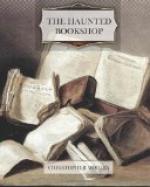He found a little confectionery shop on Wordsworth Avenue that was still open, and went in for a cup of hot chocolate to warm himself. “The expense account on this business is going to be rather heavy,” he said to himself. “I think I’ll have to charge it up to the Daintybits account. Say, old Grey Matter gives service that’s different, don’t she! We not only keep Chapman’s goods in the public eye, but we face all the horrors of Brooklyn to preserve his family from unlawful occasions. No, I don’t like the company that bookseller runs with. If ‘nach Philadelphia’ is the word, I think I’ll tag along. I guess it’s off for Philadelphia in the morning!”
Chapter XIII The Battle of Ludlow Street
Rarely was a more genuine tribute paid to entrancing girlhood than when Aubrey compelled himself, by sheer force of will and the ticking of his subconscious time-sense, to wake at six o’clock the next morning. For this young man took sleep seriously and with a primitive zest. It was to him almost a religious function. As a minor poet has said, he “made sleep a career.”
But he did not know what train Roger might be taking, and he was determined not to miss him. By a quarter after six he was seated in the Milwaukee Lunch (which is never closed— Open from Now Till the Judgment Day. Tables for Ladies, as its sign says) with a cup of coffee and corned beef hash. In the mood of tender melancholy common to unaccustomed early rising he dwelt fondly on the thought of Titania, so near and yet so far away. He had leisure to give free rein to these musings, for it was ten past seven before Roger appeared, hurrying toward the subway. Aubrey followed at a discreet distance, taking care not to be observed.
The bookseller and his pursuer both boarded the eight o’clock train at the Pennsylvania Station, but in very different moods. To Roger, this expedition was a frolic, pure and simple. He had been tied down to the bookshop so long that a day’s excursion seemed too good to be true. He bought two cigars—an unusual luxury— and let the morning paper lie unheeded in his lap as the train drummed over the Hackensack marshes. He felt a good deal of pride in having been summoned to appraise the Oldham library. Mr. Oldham was a very distinguished collector, a wealthy Philadelphia merchant whose choice Johnson, Lamb, Keats, and Blake items were the envy of connoisseurs all over the world. Roger knew very well that there were many better-known dealers who would have jumped at the chance to examine the collection and pocket the appraiser’s fee. The word that Roger had had by long distance telephone was that Mr. Oldham had decided to sell his collection, and before putting it to auction desired the advices of an expert as to the prices his items should command in the present state of the market. And as Roger was not particularly conversant with current events




